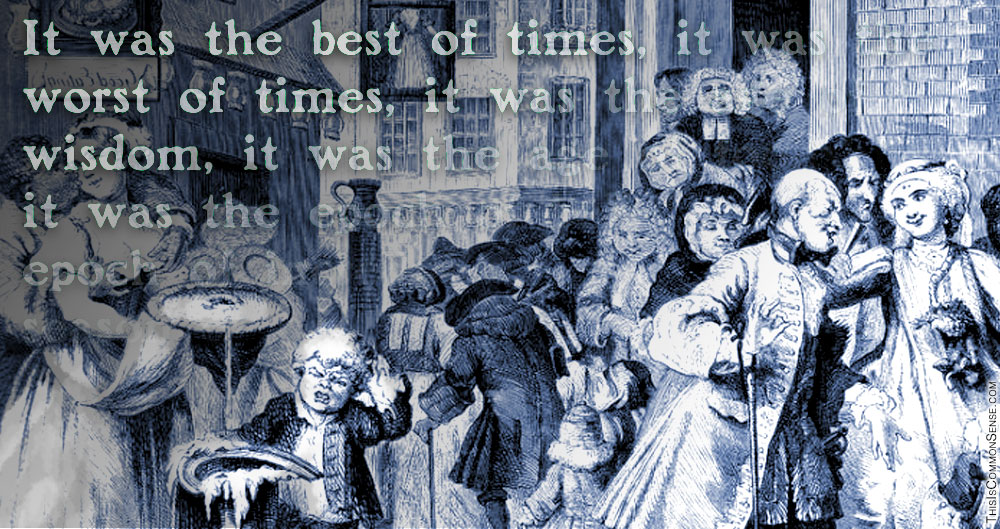Happy New Year!



“It was the best of times, it was the worst of times,” begins Charles Dickens’ popular 1859 novel, A Tale of Two Cities. The British master was not prophesying our times. He was describing the period of the French Revolution.
But the judgment feels awfully familiar.
Over at the Foundation for Economic Education, Antony Davis and James R. Harrigan talk up the case for “the best of times,” for optimism: “Global illiteracy rates are below 14 percent. Global rates of extreme poverty are below 10 percent. Despite there being more people currently alive on the planet than ever before, there are also more calories per capita than ever before.”
Davis and Harrigan provide actual reasons for thankfulness as we meet the New Year.
Is there a case for pessimism, nevertheless? Yes. And Davis and Harrigan discuss at length a topic covered here earlier this month: the Ballou High School educational improvement scandal.
Optimism and pessimism, rationally speaking, fall into two camps: private sector progress and government-sector regress.
So, following Dickens’ checklist, ours is an age of
and on and on.*
But the most unsettling thing about the “best of times” is that sometimes the great feeling of ebullience can end suddenly: one feels great in free fall — unburdened! free! — right before one hits the pavement.
Splat.
Maybe the best thing we can do this coming New Year is watch our governments as if we were hawks. To avoid the splat.
This is Common Sense. I’m Paul Jacob.
* Dickens’ long and memorable first paragraph: “It was the best of times, it was the worst of times, it was the age of wisdom, it was the age of foolishness, it was the epoch of belief, it was the epoch of incredulity, it was the season of Light, it was the season of Darkness …”

What’s all the fuss?
Congresswoman Sheila Jackson Lee (D‑Tex.) was escorted ahead of all the other passengers onto a United Airlines flight from Houston to Washington, D.C., taking seat 1A in first class.
The congresswoman described it as “nothing exceptional or out of the ordinary.”
Meanwhile, Jean-Marie Simon possessed a boarding pass for seat 1A; she attached a photo to her Facebook post. Yet, Simon was stopped when boarding the plane and told her ticket had been cancelled.
Who cancelled it? United claimed Simon did.
Simon said that’s bunk — and it does seem strange to cancel your flight and then moments later attempt to board.*
“Since this was not any fault of mine,” Rep. Jackson Lee offered, “the way the individual continued to act appeared to be, upon reflection, because I was an African American woman … an easy target.…”
’Tis the season to cry “racism.”
And yet the congresswoman characterized herself as “kind enough” to apologize “out of the sincerity of my heart” — and “in the spirit of this season.”
Doubt her kindness? You have reason:
Not “Queen for a Day,” mind you: Sheila Jackson Lee has been a congressional queen for the last 23 years! And today she is the ranking Democrat on the subcommittee on transportation security.
Feel more secure?
This is Common Sense. I’m Paul Jacob.
* And, if it was truly her own fault, United appears to be overcompensating in compensating Simon, giving her a seat in Economy Plus, a $500 voucher and numerous apologies (though not yet in writing).
Additional Background Information
Daily Caller: Congressional bosses from Hell: Sheila Jackson Lee (2011)
Weekly Standard: Sheila Jackson Lee, Limousine Liberal (2002)

Government is supposed to serve everybody … according to good, old-fashioned republican theory. But most governments serve some more than others. We can define as “corruption” any attempt to make government serve a few at the expense of the many — or the many at the expense of the few.
Illinois is corrupt, and most of us can only watch it get worse. But what can we say about those who live under the Prairie State’s thumb? When citizens see an institution slipping out of control, they can remain passive or take charge. Illinois citizens have petitioned for term limits, redistricting reform and a more transparent legislature only to be blocked again and again by the state supreme court.
What more can conscientious citizens, folks I like to call “liberty initiators” do? Well, they can
Alas, these and other expressions of “voice” have not exactly forestalled disaster.
The last resort is to “exit,” leave — vote with your feet.
The population of Illinois has declined. Many have pulled up stakes and fled across the border to Indiana and elsewhere. In the most recent year for which we have data, Illinois lost nearly 34,000 people, more than any other state.*
Unfortunately, this population loss is only an indicator of how bad Illinois State Government is doing. It offers no solution.
Except, of course, for the people who leave.
This is Common Sense. I’m Paul Jacob.
* Idaho has experienced the biggest population increase. See Reason’s reportage.

“They’ve been burned. They’ve been hammered. They’ve been bludgeoned,” George Washington University law professor Miriam Galston explained to the Washington Post. “They’re trying to survive.”
In this heartbreaking discussion at this special time of year, the “they” are the poor, long-suffering folks … at the Internal Revenue Service.
According to the Post analysis, “conservatives” have schemed to “scale back the IRS and shrink the federal government.” (I guess this is supposed to tear at every American’s heartstrings.) Notably, they “capitalized on revelations in 2013 that IRS officials focused inappropriately on tea party and other conservative groups based … Among conservatives, the episode has come to be known as the ‘IRS targeting scandal.’”
Note that term of art: episode.
The Post saw no scandal, however — despite the IRS having admitted to harassing, blocking and delaying Tea Party and conservative groups from exercising their most fundamental First Amendment rights to freedom of association and freedom of speech, in some cases for four years.
Instead, the Post decries the response to this gross violation of citizens, a congressional check on the power — and budget — of the agency responsible: reducing the budget for the Exempt Organizations division of the IRS from $102 million in 2011 to $82 million in 2016.
Heavens, Washington is never supposed to work like that! It actually approaches … accountability.
The budget cuts, along with hefty settlements the IRS is now paying to victimized groups that sued, make it less likely the IRS will repeat this scandalous … episode.
“To many, the IRS targeting of Tea Party and conservative and even some progressive groups is not a scandal,” my Sunday Townhall.com column concluded. “To me, that’s the biggest scandal of all.”
This is Common Sense. I’m Paul Jacob.
N.B. The title reference is to Neil Young’s song, Burned, which begins, “Been burned, and with both feet on the ground …”


A mad killer is on the loose!
That is one way to get attention …
The sky is falling!
You are getting the idea …
Trump is literally Hitler!
Extravagant hyperbole is not necessary to criticize the current President. Indeed, as Chicken Licken and the Boy Who Cried Wolf demonstrate, that can backfire. Especially when you are complaining about something on which Trump has proved to be pretty darn good — the tax bill, for instance.
Nevertheless, as it passed through Congress, Democrat pols and the major media dinosaurs have doubled down on overstatement: A “middle-class con job” was Sen. Ron Wyden’s characterization; singer-actress Barbra Streisand (presumably now living in Australia or Canada), re-tweeting a New York Times piece on “the Great American Tax Heist,” accused Trump of pushing the bill for “personal gain”; Bernie Sanders calls it a “tax cut for billionaires” who, instead of being helped, he says, should be “asked to pay more in taxes.”
Yes, the richest (by and large) will get the most reductions, since they pay the most taxes already. Bernie should be reminded that it is the very nature of taxes that “ask” is the wrong active verb. And calling a cut in what’s taken from taxpayers a “heist” is too absurd for commentary.
It does look like most taxpayers will get tax relief. That’s good. Alas, the debt may grow larger, depending on the economic growth spurred by the tax reform. But I notice that the Democrats tend to complain about deficits only when Republicans are in charge. And vice-versa.
Partisan Derangement Syndrome at work.
This is Common Sense. I’m Paul Jacob.